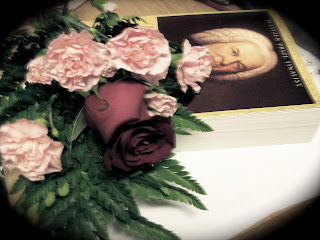As a budding organist, Bach is definitely one of my favorite composers. But not just as an organist do I say that. Having listened to an extensive amount of his music, I have found that I can honestly say that he is one of my favorite composers, whether organ, instrumental, or vocal. He is also my favorite composer because of the manner in which he conducted his life. Although there are many dedicated, disciplined musicians who composed beautiful music, not all of them showed that discipline in other areas of their lives. Bach, however, did. He has even been called the Fifth Evangelist because of his desire to compose his music for the glory of God, for the spreading of His Word, for the evangelization of the faithful. He was also a devout Lutheran, and a good father and husband. Thus, I hold him in special regard. Here is a small excerpt from this wonderful speech by Metropolitan Hilarion Alfeyev at the Catholic University of America, February 9, 2011.
Bach is a universal Christian phenomenon. His music transcends confessional boundaries; it is ecumenical in the original sense of the word, for it belongs to the world as a whole and to each citizen separately. We may call Bach an ‘orthodox’ composer in the original, literal sense of the Greek word ortho-doxos for throughout his life he learnt how to glorify God rightly. Invariably he adorned his musical manuscripts with the words Soli Deo Gloria (‘Glory to the One God’) or Jesu, juva (‘Help, O Jesus’). These expressions were for him not merely verbal formulae but a confession of faith that ran through all of his compositions. For Bach, music was worship of God. He was truly ‘catholic,’ again in the original understanding of the Greek word katholikos, meaning ‘universal,’ or ‘all-embracing,’ for he perceived the Church as a universal organism, as a common doxology directed towards God. Furthermore, he believed his music to be but a single voice in the cosmic choir that praises God’s glory. And of course, throughout his life Bach remained a true son of his native Lutheran Church. Albeit, as Albert Schweitzer noted, Bach’s true religion was not even orthodox Lutheranism but mysticism. His music is deeply mystical because it is based on an experience of prayer and ministry to God which transcends confessional boundaries and is the heritage of all humanity.
Bach’s personal religious experience was embodied in all of his works which, like holy icons, reflect the reality of human life but reveal it in an illumined and transfigured form.
Bach may have lived during the Baroque era, but his music did not succumb to the stylistic peculiarities of the time. As a composer, moreover, Bach developed in an antithetical direction to that taken by art in his day. His was an epoch characterized by culture’s headlong progression towards worldliness and humanism. Center stage became ever more occupied by the human person with his passions and vices, while less artistic space was reserved for God. Bach’s art was not ‘art’ in the conventional meaning of the word; it was not art for art’s sake. The cardinal difference between the art of antiquity and the Middle Ages on the one hand and modern art on the other is in the direction it takes: pre-Renaissance art was directed towards God, while modern art is orientated towards the human person. Bach stood at the frontier of these two inclinations, two world-views, two opposing concepts of art. And, of course, he remained a part of that culture which was rooted in tradition, in cult, in worship, in religion.

No comments:
Post a Comment